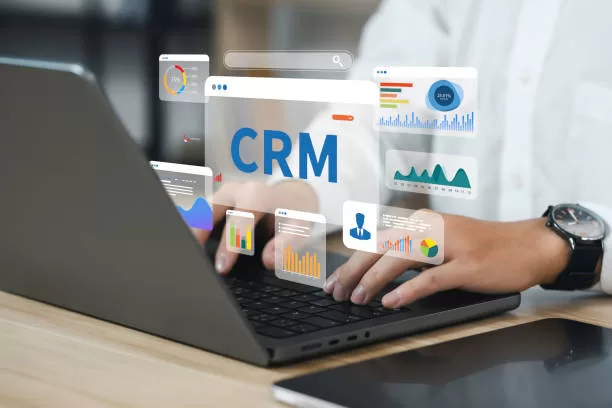What is CRM (Customer Relationship Management)?

What is CRM (Customer Relationship Management)?
by Ondray Pearson
CRM (Customer Relationship Management) What is it? In essence, CRM is a strategic approach to managing all your interactions with current and potential customers. It goes beyond simply tracking sales; CRM encompasses all aspects of the customer lifecycle, from initial contact to ongoing support and loyalty.
What Is CRM with an Example?
Imagine a coffee shop. Instead of just taking orders, they use a CRM system to track customer preferences (like favorite coffee orders and dietary restrictions). They can then use this information to personalize interactions, offer targeted promotions (like birthday discounts), and build stronger customer relationships.
What Is CRM Used For?
What Is CRM used for? CRM serves a multitude of purposes across various departments within a business:
- Sales:
- Track leads and opportunities
- Manage sales pipelines
- Forecast sales
- Automate sales tasks
- Improve sales efficiency
- Sales:
- Marketing:
- Plan and execute marketing campaigns
- Track marketing performance
- Segment customers
- Personalize marketing messages
- Build customer loyalty programs
- Marketing:
- Customer Service:
- Track customer inquiries and complaints
- Provide timely and effective support
- Improve customer satisfaction
- Build stronger customer relationships
- Customer Service:
Key Features of CRM Software
CRM software provides a centralized platform for managing customer interactions. Key features include:
- Contact Management: Store and manage customer information such as names, contact details, and purchase history.
- Sales Force Automation:
- Track leads and opportunities
- Automate tasks such as email campaigns and appointment scheduling
- Forecast sales and analyze sales performance
- Sales Force Automation:
- Marketing Automation:
- Segment customers
- Create and execute targeted marketing campaigns
- Track marketing campaign performance
- Marketing Automation:
- Customer Service Management:
- Track customer inquiries and complaints
- Manage customer support tickets
- Provide self-service options for customers
- Customer Service Management:
- Reporting and Analytics:
- Generate reports on sales performance, customer behavior, and marketing campaign effectiveness
- Gain valuable insights into customer trends and preferences
- Reporting and Analytics:
Types of CRM Software
There are several types of CRM software available, each with its own strengths and weaknesses:
- Operational CRM: Focuses on automating and streamlining business processes, such as sales and marketing.
- Analytical CRM:
- Gathers and analyzes customer data to gain insights into customer behavior and preferences.
- Analytical CRM:
- Collaborative CRM:
- Facilitates communication and collaboration between different departments within an organization.
- Collaborative CRM:
- Mobile CRM:
- Allows users to access and manage customer data from anywhere, at any time, using their mobile devices.
- Mobile CRM:
Benefits of Implementing a CRM System (What is CRM)
Implementing a CRM system can bring numerous benefits to your business, including:
- Improved Customer Relationships:
- By tracking customer interactions and preferences, you can personalize your communications and provide a more tailored experience.
- Improved Customer Relationships:
- Increased Sales:
- CRM software can help you identify and prioritize sales opportunities, automate sales tasks, and improve sales efficiency.
- Increased Sales:
- Enhanced Customer Service:
- By tracking customer inquiries and complaints, you can provide faster and more effective support.
- Enhanced Customer Service:
- Improved Marketing Effectiveness:
- CRM software allows you to segment customers, personalize marketing messages, and track the effectiveness of your marketing campaigns.
- Improved Marketing Effectiveness:
- Increased Efficiency and Productivity:
- By automating many of your business processes, you can free up your team to focus on more strategic tasks.
- Increased Efficiency and Productivity:
Challenges of CRM Implementation
While CRM offers numerous benefits, implementing a CRM system can also present some challenges:
- Cost:
- CRM software can be expensive, especially for larger businesses.
- Cost:
- Implementation:
- Implementing a CRM system can be a complex and time-consuming process.
- Implementation:
- Data Quality:
- Ensuring data accuracy and completeness is crucial for the success of your CRM system.
- Data Quality:
- User Adoption:
- Encouraging employees to use the CRM system effectively can be challenging.
- User Adoption:
- Integration:
- Integrating your CRM system with other business applications can be complex.
- Integration:
Choosing the Right CRM for Your Business
Choosing the right CRM software for your business depends on a number of factors, including:
- Your budget
- The size of your business
- Your specific business needs
- The features offered by different CRM systems
Some of the most popular CRM software options include:
- Salesforce CRM:
- A leading CRM platform with a wide range of features and a strong market presence.
- Salesforce CRM:
- HubSpot CRM:
- A user-friendly and affordable CRM platform that integrates seamlessly with other HubSpot marketing and sales tools.
- HubSpot CRM:
- Microsoft Dynamics CRM:
- A powerful CRM platform that is well-suited for larger enterprises.
- Microsoft Dynamics CRM:
Conclusion
What Is CRM? In conclusion, CRM is a critical tool for businesses of all sizes. By implementing a CRM system and utilizing its features effectively, you can improve customer relationships, increase sales, and drive business growth.
Are you hungry for more actionable tips? ODP Blog News is your one-stop shop for expert strategies, insightful articles, and powerful tools to fuel your digital success.
hentairead Nice post. I learn something totally new and challenging on websites
That is wonderful i’m glad that it helped
Tech dae Awesome! Its genuinely remarkable post, I have got much clear idea regarding from this post . Tech dae